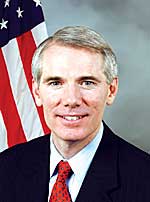This column originally appeared in the Sandusky Register on May 8, 2021.
Spring is a time of new beginnings, so it is a fitting time to hold up those who have started new lives of meaning and purpose after being convicted of a crime and serving their time. 
Helping formerly incarcerated individuals overcome their past mistakes and reenter society as productive citizens makes sense for everyone: those formerly incarcerated and their families, neighbors who will live in safer communities, law enforcement and the taxpayer.
We know that 95 percent of people who are incarcerated will be released, and more than half of the people released from prison each year are arrested again within three years. We need to break that cycle of recidivism by reconnecting them with their communities, and one of the best ways we can do that is through helping them gain the skills they need to reenter the workforce and providing treatment for substance-abuse and middle health issues.
As a country, we have come a long way on this issue over the past decade or so. More than 10 years ago, I co-authored bipartisan legislation called the Second Chance Act, which helps people get back on their feet through supporting state and local reentry programs. A few years ago, I joined my colleague, Democrat Sen. Patrick Leahy of Vermont to renew and strengthen the Second Chance Act as part of the First Step Act, including adding nonprofit organizations as eligible grant recipients and requiring rigorous audits to ensure that federal dollars are spent wisely.
Since 2009, more than 800 Second Chance Act grant awards have been made, and last year we secured $100 million in funding — a record. I have seen the results of the Second Chance Act firsthand at reentry programs across Ohio, including great northwest Ohio nonprofits like Goodwill Industries in Toledo. Recently, we had a great dialogue with the Toledo Chamber of Commerce and Ron and Cathy Tijerina from the RIDGE Project about how the program has helped them support Second Chance families in Northwest Ohio.
Our mission to help those who want a second chance continues. During the COVID-19 pandemic, I worked to ensure that our Second Chance citizens were not forgotten. For example, we found out that the popular Paycheck Protection Program to help small businesses affected by the pandemic, had barriers for small business owners who had unrelated felony records. This was brought to my attention by a Second Chance small business owner in Ohio named Troy Parker. Troy took all the right steps after leaving the criminal justice system, starting his own successful cleaning business and hiring other second chance employees. His cleaning business got hit hard by COVID-19, but because of his past criminal record, he could not receive this much-needed relief. When Troy told us his situation, we worked with the Treasury Department to change the rules to allow for folks like him to get a loan and help keep the lights on through this unprecedented time.
Looking ahead, there is still more work for us to do to reduce recidivism rates and allow all Americans to overcome their past mistakes.
Right now, I am working to pass bipartisan legislation called the Reentry Employment Opportunities Act to do just that. Along with my colleague, Democrat Senator Gary Peters of Michigan, I introduced this legislation to make permanent the Labor Department’s Reentry Employment Opportunities grant program, which currently exists as a pilot program authorized under Workforce Innovation and Opportunity Act. The REO program supports national, regional, and local skills training organizations that provide outstanding opportunities for returning citizens to get skills that will help them find both good-paying jobs and the stability and purpose that comes from a career.
The REO program has been successful, but right now it does not have a dedicated funding stream to support its important mission. I believe it’s critical we make the REO program permanent so that more folks reentering society after time in the justice system can get the helping hand they need to enter the workforce and break the cycle of recidivism. I will continue to work in Washington to get this important legislation passed.
I’m proud to be a partner in Washington for Ohioans and all Americans looking to get a Second Chance, turn their lives around, and achieve their God-given potential.
